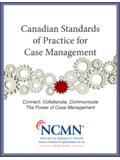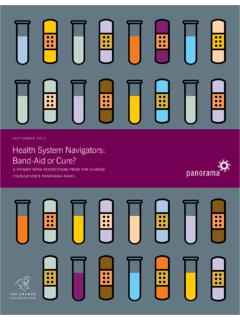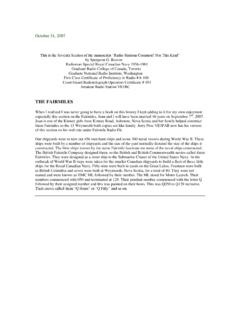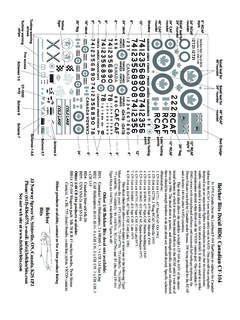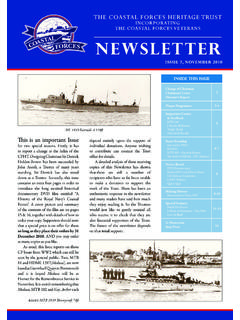Transcription of Canadian Standards of Practice for Case Management
1 Connect, Collaborate, Communicate The Power of Case ManagementCanadian Standards of Practice for Case ManagementProduction of this booklet has been made possible through a financial contribution from Health views expressed herein do not necessarily represent the views of Health materials are provided for informational purposes only. The authors/owners are notresponsible for the accuracy or completeness of the contents and make no representations,conditions or warranties. The reader uses these materials at their own 2009 ALL RIGHTS RESERVED. No part of this publication may be reproduced, stored in aretrieval system or transmitted in any form or by any means, electronic, mechanical, photocopying, recording, or otherwise, without written permission of the National Case Management Network:National Case Management CataloguingCanadian Standards of Practice for Case MangementISBN 978-0-9812629-0-12ince the National Case Management Network of Canada (NCMN) was launched in November2006, there has been intent to bring together a representative group of stakeholders to begin the development of national Case Management Standards .
2 In 2008 this intent became a reality. e purposeof the Canadian Standards of Practice for Case Management is to establish a level of excellence andpoint of reference against which individuals can be compared and evaluated. It is the hope of NCMN that these Standards can be translated into improved health for Canadians and a strengthened Canadian healthcare system. e long-term objective of the NCMN awaits fulfillment the dissemination and implementation of these National Standards throughout Canada for use by Case Management professionals and practitioners, by supervisory and quality assurance personnel, and by government andpolicy makers. e Standards represent a consensus document based on the collective wisdom of theNCMN Standards Roundtable, NCMN Standards Workgroup, NCMN membership, and Case Management communities of Practice . With great pleasure, I present the Canadian National Standardsof Practice for Case Management and on behalf of the Executive Committee of the NCMN, we look forward to the Standards taking P PresidentNCMN 2009 SPrefAce e national case Management network (ncmn)
3 Of Canada wishes to extend thanks and appreciation to the members of the NCMN Standards Workgroup for theirenthusiastic and dedicated AmodeoBarbara Baptiste Shannon Berg Barbara Copp-EngstromKathy Craig Kay FitzgeraldJo-Ann HarrisSandy Jenkins Sarah KravetzJill MacLean Kathy Nakrayko Barbara NewportJoan Park Raymond Rupert, MD Elaine Sandor Elaine Somers Andre WagnerstAndArdsworkgrouPCanadian Standards of Practice for Case ManagementBayshore Home Health ServicesRehabilitation Management IncVancouver Coastal Health AuthorityVeterans Affairs CanadaCraig ResearchWorkplace Health and Safety Compensation Commission of New BrunswickWorkplace Safety and Insurance BoardHamilton Niagara Haldimand Brant Community Care Access CentreClarendon Foundation (Cheshire Homes) Community Support Association (OCSA)Veterans Affairs CanadaSaskatoon Health RegionChamplain Community Care Access CentreSt.
4 Michael s HospitalRupert Case Management ServicesRehabilitation Management IncCanadian Forces - Department of National DefenceCommunity Resource Connections of Toronto4 PREFACE2 ACKNOWLEDgEMENTS2 STANDARDSWORKgROuP3 BACKgROuND TODEVELOPMENT OFNATIONALSTANDARDS5 CASEMANAgEMENTFRAMEWORK6 CASEMANAgEMENTDEFINITION7guIDINgPRINCIPL ES7 Case Management Supports Client Rights7 Case Management Is Purposeful 7 Case Management Is Collaborative 7 Case Management Supports Accountability 7 Case Management Strives For Cultural Competency8 STRuCTuRE OFSTANDARDS9 Standards OFCASEMANAgEMENT10I. Client Identification And Eligibility For Case Management Services 10II. Assessment 11 III. Planning 13IV. Implementation 14V. Evaluation 15VI. Transition 16 REFERENCES17tAble ofcontents5national case Management network of canada e NCMN of Canada is established as a non-profit, membership-based, multi-disciplinary, professional organization dedicated to the support and advancement of Case Management professionalsand practitioners.
5 Rough its leadership goal, NCMN seeks to identify Case Management best practices, to steward these discoveries into meaningful Standards of knowledge, and to disseminate that knowledge nationwide. In 2008, NCMN of Canada committed itself to producing National Standards of Practice that reflect theCanadian context. is has meant creating Standards that are broad in scope while lending themselvesto the ability to be met and measured. e Standards are not intended to replace existing professional licensure requirements or Collegestandards. Instead, NCMN Standards focus on the Practice of Case Management for all to benefit fromthe existence of clear and concise Practice Health care systemCanada's national health insurance program, o en referred to as "Medicare," is designed to ensure thatall residents have reasonable access to medically necessary hospital and physician services, on a prepaidbasis.
6 Instead of having a single national plan, Canadians have a national program that is composed of13 interlocking provincial and territorial health insurance plans, all of which share certain common features and basic Standards of coverage. Framed by the Canada Health Act, the principles that governour healthcare system are symbols of the underlying Canadian values of equity and solidarity. Provincialand territorial governments are responsible for the Management , organization, and delivery of healthservices for their residents. e Canada Health Act excludes members of the Canadian Forces (CF) from the list of persons whomay receive health care under provincial health insurance plans. According to the Act, a person insuredunder the health care insurance plan of a province is a resident of the province, with the primary exception being when one is a member of the Canadian Forces. In that exception, the Department ofNational Defence (DND) is required by law to provide medical care to all members of the CF, both inCanada and todeveloPmentofnAtionAlstAndArdsCanadian Standards of Practice for Case Management6case Management and the Canadian Health care systemIn the Romanow report (2002), Building on Values e Future of Health Care in Canada, a recommendation is made that the Canada Health Act be expanded to include coverage for three priorityareas: home mental health case Management and intervention services; post-acute home care and rehabilitation services including case Management , health professional services, and medication Management .
7 And palliative home care services including pain and symptom relief, case Management ,professional services, medication Management , and counseling when forward, concrete actions to improve integration and continuity of care include establishingpolicies that foster the most cost-effective delivery of services through coordinated, ongoing, system-level case Management whatever the site of service and that provide stability for clients, families andservice providers. Such policies would also support the Canadian government s commitment to keeppeople in the community as long as possible and out of outline the context within which the Standards of Practice have been developed, Case Managementis defined, and the guiding principles adopted by NCMN to support the Standards are explained. e following structure depicts how the NCMN Standards provide a framework for Case Managementpracticed within various settings and sectors in Canada.
8 Each step requires preserving and honouringthe stipulations of the preceding legislation and Standards step(s).increasing specificity tocase managementorganizationalstandardsncmn standardsProfessionalstandardsenablingle gislation7 Case Management is a collaborative, client-driven process for the provision of quality health andsupport services through the effective and efficient use of resources. Case Management supports theclients achievement of safe, realistic, and reasonable goals within a complex health, social, and Standards of Practice for Case ManagementguidingPrinciPles e National Case Management Network of Canada presents the following principles to guide Management supports client rightsCase Managers support the rights of clients within the funding and legislative frameworks thataffect the relationship between the client, service providers, and payers. is is achieved throughestablishing effective relationships with the clients, ones in which the Case Managers assess andsupport the ability of individual clients to achieve their Management is Purposeful e actions of Case Managers must address the specific needs of clients as documented in eachclient s goals.
9 Erapeutic interventions should best meet the client s needs. Case Managers assistclients in the selection of services and resources that are of the highest possible quality within theaccessible range of Management is collaborativeCase Managers work within a larger community system. Many individuals and groups cometogether to support clients, with their consent, to achieve health and independence. Successrequires collaborative and proactive relationships to facilitate the client s goals. Whenevernecessary, Case Managers refer clients to other practitioners who have skills and knowledge to bestmeet the client s Management supports AccountabilityCase Managers facilitate and organize service delivery that is coordinated, timely, andappropriate for each client s optimal health care benefit, goal achievement, and maximal selfcareand independence. e role of the Case Manager is dynamic because it is both proactive inassessing and planning and responsive to the changing abilities and needs of the client.
10 CaseManagers work to ensure equitable access to healthcare services and use of healthcareresources that is ethically responsible and fiscally Management strives for cultural awareness is the demeanor through which the Case Manager displays respect, appreciation, and sensitivity to the values, beliefs, lifeways, practices, and problem-solving strategies of a client s culture and heritage. Cultural competence is the conscious application of aprotocol of congruent behaviours, attitudes, and policies within a system or agency or among individual professionals that enables the system, agency, or professionals to work effectively incross-cultural interactions. To provide culturally competent service, a Case Manager remainsaware to replace one s own biases by collecting relevant cultural data, seeking knowledge about cultural distinctions, and partnering with others who are fluent in diverse cultures (as appropriate).


